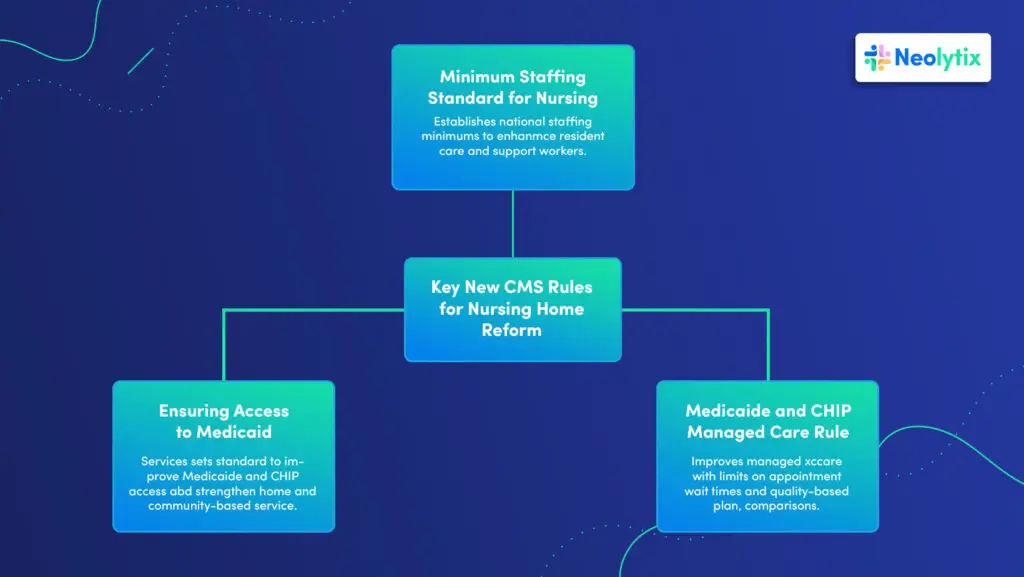The Biden-Harris Administration has announced three final rules through the Centers for Medicare & Medicaid Services (CMS), aimed at transforming healthcare in the United States. These rules, published through The US Department of Health and Human Services, focus on increasing access to quality care, enhancing support for families and care workers, and improving the safety and quality of care in federally funded nursing homes.
This historic move has profound implications for healthcare providers and organizations across the country.
Let’s explore the details and understand what it means for healthcare providers, and you can capitalize on this historic change.

The Impact of the New CMS Regulations
The three new CMS rules create a significant shift in the healthcare landscape, introducing stricter standards and new practices that impact providers, patients, and the overall healthcare system. Here is a summary of the three critical components:
- Minimum Staffing Standards for Nursing Homes
For the first time, CMS has established national minimum staffing requirements to improve the quality of care in nursing homes. This new rule mandates that nursing homes provide residents with at least 3.48 hours of nursing care per day, including at least 0.55 hours from a registered nurse.
Furthermore, it requires a registered nurse to be on-site 24/7 to ensure patient safety and meet residents’ critical care needs. The rule also encourages nursing homes to develop a staffing plan to enhance recruitment and retention. - Access to Medicaid and CHIP Services
The “Access Rule” aims to improve access to healthcare services for Medicaid and CHIP beneficiaries by creating national standards for wait times and strengthening home and community-based services (HCBS). States must now conduct “secret shopper” surveys to verify compliance with appointment wait times, allowing CMS to identify discrepancies and improve service quality.
This rule also enhances transparency by requiring public disclosure of provider payment rates and establishing beneficiary advisory committees for direct feedback from those who use Medicaid and CHIP services. - Managed Care Access, Finance, and Quality
The Managed Care rule focuses on enhancing access, accountability, and transparency for Medicaid and CHIP managed care plans. It requires states to set quality standards, disclose provider payment rates, and conduct periodic quality assessments.
This rule also defines “in lieu of services and settings” (ILOS), which can support patients’ health-related social needs, such as housing and nutrition. The new quality rating system allows beneficiaries to compare plans based on factors like quality, access to providers, and other key metrics.
The Impact on Skilled Nursing Facilities (SNFs) and the Nursing Shortage
The introduction of minimum staffing standards for nursing homes means SNFs must meet stricter requirements for nurse-to-patient ratios. This impacts recruitment and retention strategies as facilities are compelled to hire more nursing staff to comply with the regulations.
The nursing shortage compounds the challenge. As SNFs face heightened demand for skilled nursing care, the shortage may lead to increased competition for qualified personnel. Facilities will need to implement creative hiring solutions, invest in nursing education programs, and consider alternative staffing approaches like using virtual assistants to alleviate some of the administrative burdens on nursing staff.
How Healthcare Providers and Organizations Should Prepare
Given these changes, healthcare providers and organizations must take proactive steps to comply with the new CMS rules and ensure a smooth transition to the updated standards. Here are some crucial actions healthcare providers should consider:
- Assess Staffing Needs
To meet the new staffing standards, healthcare providers should evaluate their current staffing levels and ensure they have enough registered nurses and nursing aides to comply with the minimum requirements. This assessment may also involve creating a staffing plan to improve recruitment and retention.
- Strengthen Compliance Systems
With increased emphasis on compliance, healthcare providers should review their existing processes to ensure they meet the new Medicaid and CHIP standards. This includes creating robust documentation systems, streamlining patient data management, and adhering to the No Surprises Act.
- Enhance Patient Experience
Improving patient experience is crucial to align with the new Access Rule, which focuses on reducing appointment wait times and enhancing service delivery. Healthcare providers should consider optimizing patient intake processes, implementing telehealth services, and improving communication with patients to reduce wait times and improve satisfaction.
- Invest in Technology
The Managed Care rule’s emphasis on transparency and quality requires healthcare providers to invest in technology that supports compliance and quality assessments. Updating EHR/EMR systems, implementing AI quality assessments, and utilizing robust reporting tools can help meet these new standards.
How Neolytix Can Support SNFs in Meeting New Staffing Standards
As Skilled Nursing Facilities (SNFs) navigate the new CMS staffing standards and nursing shortage, Neolytix offers a suite of services to help you stay compliant and maintain high-quality care. Our solutions address key areas impacted by these changes, providing the support you need to thrive in this evolving healthcare landscape.
- Recruitment Process Outsourcing
Finding skilled nursing staff is a significant challenge, especially in light of the nursing shortage. Neolytix’s Recruitment Process Outsourcing (RPO) service streamlines your hiring process, enabling you to attract top nursing talent efficiently. Our experts manage the entire recruitment cycle, from sourcing candidates to onboarding, saving you valuable time and resources. This ensures that you meet the new staffing standards without sacrificing quality.
- Virtual Registered Nurses
Virtual Registered Nurses (RNs) can supplement your on-site staff, handling tasks that don’t require physical presence while maintaining high standards of care. Neolytix provides experienced virtual RNs who can assist with remote triage, telehealth appointments, and patient monitoring.This approach helps alleviate the workload on your on-site nurses, allowing them to focus on direct patient care and comply with the CMS staffing requirements.
- Remote Patient Monitoring (RPM)
To further support your nursing staff and improve patient care, Neolytix offers Remote Patient Monitoring (RPM) and Chronic Care Management (CCM) services. RPM allows you to track patient health remotely, reducing the need for frequent in-person visits and enabling early intervention in case of health concerns.
Embrace the Future of Healthcare
Extend your care beyond your practice boundaries and unlock additional revenue streams
Our RPM solutions integrate seamlessly with your existing systems, providing real-time health data that can improve patient outcomes and streamline nursing workloads.
Optimizing Revenue Cycle Management To Capitalize From New CMS Standards
The recent CMS rules underscore the importance of efficiency, compliance, and financial stability in Skilled Nursing Facilities (SNFs). Revenue Cycle Management (RCM) plays a critical role in ensuring SNFs can meet these new requirements while maintaining a healthy bottom line. Neolytix’s comprehensive RCM services can help your facility navigate the complexities of the new landscape.
Improving Patient Access: The CMS’s focus on access to care means that patient intake and registration processes must be seamless and efficient. Neolytix’s RCM services include Patient Access Solutions, which streamline the patient onboarding process, improve insurance verification, and ensure compliance with the No Surprises Act. This leads to a smoother experience for patients and reduces administrative burdens for your staff.
Enhanced Compliance and Audit Readiness: Compliance is a top concern for SNFs, especially with the new CMS rules. Neolytix’s RCM services include regular coding audits to ensure your billing processes are compliant with healthcare regulations.
We identify and correct any discrepancies, providing you with peace of mind and reducing the risk of penalties. Our compliance-focused approach keeps you ready for audits at all times.
Data-Driven Revenue Optimization: With Neolytix’s medical billing services, you can identify patterns in your revenue cycle, such as frequent claim denials or delays in reimbursement. This data-driven approach enables you to take corrective action to streamline your billing processes and ensure timely payments.
By partnering with Neolytix, healthcare providers and SNFs can ensure a smooth transition to the new CMS regulations, meet staffing standards, improve patient care, and ensure they maximize their future returns.
Schedule a consultation with us today to discover how Neolytix can support your healthcare organization in this new era of healthcare.
Complete the form and someone from our team will be in touch with you!



